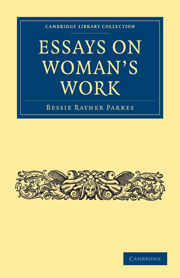VIII - WORKS OF BENEVOLENCE
Published online by Cambridge University Press: 05 July 2011
Summary
THIS subject has been so amply treated of by writers possessing practical acquaintance with its details, that though, in its widest sense, it is, in my judgment, more important and more interesting than any other, it would be superfluous and almost impertinent to speak of it in this book, except in its economical aspect. To say nothing of continental labours and sources of information—to say nothing of the vast and efficient organisations of the Church of Rome, we have had in England Mrs Jameson, Florence Nightingale, Mary Carpenter, Louisa Twining, Dr Howson, Mr Ludlow, and many more, writing of this portion of woman's work in almost every point of view from which it can be regarded, except perhaps that on which I purpose to touch, the relief of the labour market by the drafting off of the most reliable candidates into these works. Even unpaid religious communities relieve the labour market. It is very true that each individual worker is a disinterested volunteer, but it is equally true that wherever the system is really organised, all the workers are fed, clothed, and supported in old age in the cheapest manner from the funds of the institution, and thus constitute a very important part of the paid labour of the country. Those who are rich bring or leave fortunes to the community; but excellent and valuable workers are often taken in without money, or with a smaller portion; and thus, regarding the question on its purely economical side, they give their labour for a permanent maintenance.
- Type
- Chapter
- Information
- Essays on Woman's Work , pp. 183 - 194Publisher: Cambridge University PressPrint publication year: 2010First published in: 1865



